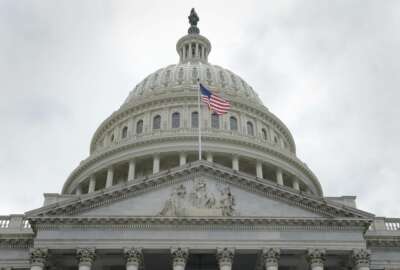
Labor Dept.’s OFCCP to visit hundreds of contractors in the coming months
In today's Federal Newscast, the Labor Department's Office of Federal Contract Compliance Programs sent letters to 445 vendors alerting them about an upcoming...
To listen to the Federal Newscast on your phone or mobile device, subscribe on PodcastOne or Apple Podcasts. The best listening experience on desktop can be found using Chrome, Firefox or Safari.
- Hundreds of government contractors should expect a visit from the Labor Department’s Office of Federal Contract Compliance Programs in the coming months. Labor’s OFCCP sent letters to 445 vendors alerting them about an upcoming review. Among the areas Labor will review is how contractors are meeting requirements to take affirmative action and not discriminate on the basis of race, color, sex, sexual orientation, gender identity, religion, national origin, disability, or status as a protected veteran. (Department of Labor)
- Over 3,800 civilian federal employees and 9,700 military personnel deployed to respond to Hurricane Florence. Their jobs ranged from first responders to securing and repairing power to monitoring the shutdown of nuclear power plants. The Federal Emergency Management Agency is coordinating the efforts from regional and national emergency response centers. (Federal News Radio)
- An environmental group questions the hiring of non-career, temporary acting officials at the Interior Department. In emails obtained by Public Employees for Environmental Responsibility, GAO said it may look into “time violations” at Interior under the Federal Vacancies Reform Act. Secretary Ryan Zinke has tapped three non-career officials to serve as the acting heads of the National Park Service, the Fish and Wildlife Service, and the Bureau of Land Management. (Federal News Radio)
- The Federal Communications Commission chairman hinted at a lawsuit against California. Ajit Pai, speaking to the Maine Heritage Society in Portland, referenced a bill now before Gov. Jerry Brown that would impose so-called net neutrality rules in that state that were overturned by the FCC nationally last year. Pai called the proposed California rules illegal, citing an 8th circuit appeals court ruling against state regulation of information services. He vowed to fight to maintain federal policy nationally. (Federal Communications Commission)
- A federal appeals court ruled against the Army in a long-running legal dispute over its Distributed Common Ground System. The Court of Appeals for the Federal Circuit sided with Palantir, which argued the Army had effectively excluded its technology from the DCGS procurement process by insisting on a traditional engineering and development contract. Upholding the decision of a lower court, the judges found the Army violated the Federal Acquisition Streamlining Act, which requires the government to buy commercial products instead of paying for new development work whenever possible. (Federal News Radio)
- Army leaders do not have a clear, quantifiable way to judge if Futures Command will work. Futures Command leader Gen. John Murray said it will be hard to determine the command’s value to the warfighter purely through metrics. That concerned some lawmakers, who fear the command will turn into another bloated bureaucracy. (Federal News Radio)
- The Joint Enterprise Defense Infrastructure (JEDI) cloud program may be getting more restrictions from Congress. The Defense appropriations bill fences off funds for the cloud project until the Pentagon provides a budget accounting system which provides transparency on all cloud computing systems in the military. Congress also wants a written strategy for the JEDI contract. Senate and House conferees agreed to the appropriations bill last week. (House Appropriations Committee)
- The Centers for Medicare and Medicaid Services may soon be testing out new cybersecurity protections for Medicare. The House wants CMS to use smart identity cards to fight Medicare improper payments. Lawmakers pass the Fighting Fraud to Protect Care for Seniors Act last week. The legislation calls for CMS to conduct a pilot of about 2,000 beneficiaries in three areas of the country to use smart identity cards to obtain services. Lawmakers hope using smart identity cards will help stem the tide of about $50 billion a year going out as improper payments under Medicare. The Senate doesn’t yet have a companion bill. (Congress.gov)
- The National Institute of Standards and Technology is seeking help from the public in developing a voluntary privacy framework. NIST will hold its first public workshop in Austin, Texas in October to get feedback from public and private sector organizations. The framework helps identify, asses, manage and communicate privacy risks, and innovate around privacy protection. (National Institute of Standards and Technology)
Copyright © 2025 Federal News Network. All rights reserved. This website is not intended for users located within the European Economic Area.
Eric White
Eric White is news anchor and Federal Drive producer at Federal News Network.
Follow @FEDERALNEWSCAST





